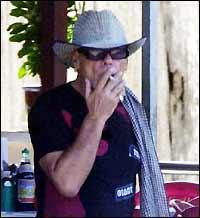Lawmakers debate animal virus research (AP)
Lawmakers are debating legislation to give national security officials full control over whether to move research of highly contagious foot-and-mouth disease from an isolated island laboratory to the U.S. mainland near herds of livestock.
The Bush administration requested the change, which would erode the role of the Agriculture Department in deciding the safest location to conduct research involving one of the world's most contagious animal viruses. The virus does not infect humans.
Under current law, the secretary of agriculture would issue a permit to move the research from a lab on isolated Plum Island, N.Y., only if he determined the move to be necessary and in the public's interest. The Senate's version of a farm bill would direct the secretary to approve the permit, so the Homeland Security Department could move ahead with its plans to build a new research facility on the mainland.
The House version of the same legislation would leave in place the agriculture secretary's discretion.
The Senate proposal was jointly requested by the departments of Agriculture and Homeland Security, said Erin Hamm, spokeswoman for Sen. Saxby Chambliss, R-Ga. The Senate plan would prevent the agriculture secretary under the next presidential administration from easily interfering with the lab's relocation to the mainland.
Chambliss, the Senate Agriculture Committee's top Republican, supports moving the virus research, and Athens, Ga., is one of the candidate sites for the government's new lab. The other possible locations are Manhattan, Kan.; Butner, N.C.; San Antonio; and Flora, Miss.
Democratic leaders of the House Energy and Commerce Committee, some community activists and some livestock groups say it's too dangerous to bring foot-and-mouth research near commercial herds, although the livestock industry is divided. The committee asked 103 livestock groups whether they support moving the lab; only 19 responded: Eight were undecided, seven opposed it and four favored the move.
The Homeland Security Department "claims to have the support of the livestock industry to move foot-and-mouth disease to the mainland, but our survey shows that some of that support may have been written in disappearing ink," said Rep. John Dingell, D-Mich., chairman of the Energy and Commerce Committee.
Foot-and-mouth virus can be carried on a worker's breath or clothes, or vehicles leaving a lab. The existing lab is 100 miles northeast of New York City in the Long Island Sound, accessible only by ferry or helicopter. Researchers there who work with the live virus are not permitted to own animals at home that would be susceptible, and they must wait at least a week before attending outside events where such animals might perform, such as a circus.
If even a single cow signals an outbreak in the U.S., emergency plans permit the government to shut down all exports and movement of livestock. Herds would be quarantined, and a controlled slaughter could be started to stop the disease from spreading.
Infected animals weaken and lose weight. Milk cows don't produce milk. They remain highly infectious, even if they survive the virus.
Note: Headline links to source.














0 Comments:
Post a Comment
<< Home